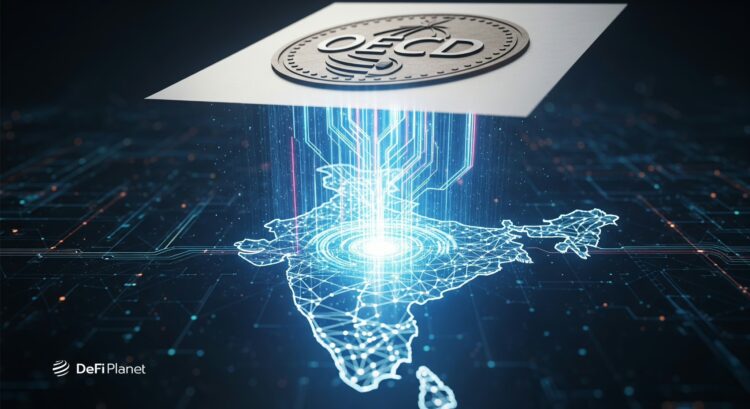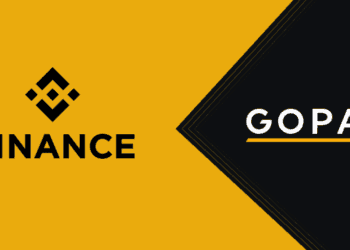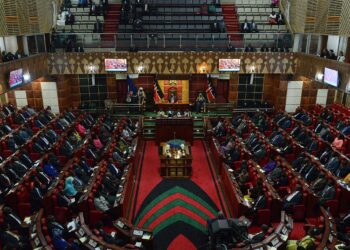Quick Breakdown:
- India plans to implement the OECD’s CARF by April 2027, requiring detailed reporting of crypto transactions to improve transparency, reduce tax evasion, and align with international regulations.
- Indian and global platforms serving Indian users will face stricter reporting, enhanced KYC, and higher compliance costs, potentially leading to market consolidation and influencing investor behaviour.
- India’s move sets a benchmark for emerging economies, promoting standardized crypto regulation, cross-border data sharing, and greater global trust in digital assets.
India is preparing to adopt the OECD’s new Crypto-Asset Reporting Framework (CARF), a global standard designed to track and report crypto transactions across borders, effective April 2027.
🚨 NEW: 🇮🇳 India to adopt OECD’s global Crypto-Asset Reporting Framework (CARF) by 2027.
➡️ Offshore crypto holdings of Indian residents to face new tax reporting rules.
➡️ India already enforces one of the toughest regimes (30% gains tax, 1% TDS, No loss-setoff).
Now offshore… pic.twitter.com/jjtnbYLFky
— Crypto India (@CryptooIndia) September 2, 2025
CARF requires exchanges, brokers, and other service providers to share detailed information about users’ holdings and trades with tax authorities.
India\’s crypto regulation goal is to close loopholes, improve transparency, and ensure governments don’t lose revenue as adoption grows. Global reporting standards like CARF are being pushed because crypto’s borderless nature makes it easy to hide assets or move funds undetected.
By aligning countries under a common framework, regulators hope to reduce tax evasion, protect investors, and bring crypto closer to the level of oversight seen in traditional finance. But how will India’s OECD reporting rules impact the crypto market?
India’s Stance on Crypto Taxation So Far
India has taken one of the toughest approaches to taxing digital assets. Since 2022, all profits from trading or investing in crypto have been subject to a 30% flat tax, with no allowance for deductions on expenses like transaction fees.

On top of this, the government introduced a 1% tax deducted at source (TDS) on every crypto transaction, whether profitable or not. The aim was to improve traceability, but in practice, it has reduced liquidity on Indian exchanges by making frequent trading expensive.
Currently, investors must report their crypto gains separately from other income when filing taxes. However, there are still practical challenges. Many users struggle to track trades across multiple platforms, especially when using decentralised exchanges or foreign exchanges that don’t issue standardised tax forms.
Exchanges themselves face compliance hurdles, often needing to implement complex systems to deduct TDS and report user activity to the tax authorities. This fragmented approach has created confusion for both investors and platforms, setting the stage for why global standards like the OECD report 2025 could make a big difference.
What Changes with OECD Alignment
If India adopts the OECD reporting framework, the way crypto activity is tracked will shift significantly. Exchanges, custodians, and even wallet providers operating in India will face new reporting obligations. They’ll be required to collect detailed user information, verify identities more thoroughly, and submit transaction data to tax authorities in a standardised format.
Another key change is information sharing across borders. Data collected in India could be shared with tax authorities in other OECD-aligned countries, and vice versa. This would make it much harder for investors to hide profits by using offshore exchanges or wallets outside India’s current reporting reach.
For tax authorities, India\’s crypto regulation means greater transparency. They’ll have access to consistent, real-time data on who is trading, where, and how much. This could close existing loopholes, reduce tax evasion, and bring crypto reporting closer to the way international banking is already monitored under frameworks like the Common Reporting Standard (CRS).
Impact on Indian Exchanges and Global Platforms
Indian exchanges will need to upgrade their systems to meet strict reporting standards, including enhanced KYC checks, detailed transaction monitoring, and regular data submissions to regulators. These upgrades could raise costs significantly, putting pressure on smaller platforms with limited resources.
Cross-border implications for platforms serving Indian users
Global exchanges that allow Indian users may also have to comply with India’s crypto regulation if they want to continue serving the market. This could mean stricter onboarding processes for Indian traders, new tax disclosures, or even restrictions on certain services if compliance proves too complex.
Possibility of consolidation in the Indian crypto exchange market
The added compliance costs may push smaller or mid-sized exchanges out of the market, leading to consolidation. Larger, better-funded players are more likely to survive, potentially strengthening their dominance but reducing overall competition and choice for Indian users.
Investor Behaviour and Compliance Costs
For everyday investors, the extra transparency could feel intimidating. More detailed tax reporting and monitoring may discourage smaller traders who worry about compliance errors or the cost of filing. This could slow retail adoption, especially among casual users.
Impact on high-net-worth and institutional investors
Wealthier individuals and institutions are more likely to continue investing, but they’ll face higher costs for compliance and professional advice. For some, this added burden may reduce appetite for riskier crypto assets, shifting demand toward more regulated or mainstream products.
Risks of capital moving to informal or offshore channels
If investors find local rules too strict or costly, some may turn to offshore exchanges, peer-to-peer platforms, or unregulated alternatives. This creates the risk of capital flight and undermines the transparency that the OECD reporting framework aims to achieve.
Broader Implications for Global Reporting Standards
With millions of active users, India ranks first in the 2025 global crypto adoption index. Its decision to implement OECD reporting standards sends a strong signal that compliance and transparency are becoming non-negotiable, potentially influencing how other large markets approach regulation.

How OECD-aligned reporting could shape adoption in other emerging economies
Emerging economies often look to major markets like India for regulatory direction. If India successfully balances investor protection with innovation, other developing nations may adopt similar reporting rules, accelerating the spread of unified standards worldwide.
Contribution to a more standardised global regulatory environment
By aligning with the OECD reporting framework, India adds momentum toward a consistent international system for crypto taxation and reporting. This reduces opportunities for regulatory arbitrage and strengthens global cooperation, helping tax authorities close loopholes and build trust in the digital asset ecosystem.
READ ALSO: Asia’s Wealthy Investors are Adopting Crypto Heavily: What This Means
Conclusion: India as a Compliance Trendsetter?
India’s adoption of OECD reporting rules positions it as a potential global compliance leader. By emphasizing transparency and tax accountability, India\’s crypto regulation aims to protect investors while supporting market growth. The challenge is balancing strict rules with innovation; handled well, crypto is legitimized; mishandled, activity may move offshore or slow domestically.
Disclaimer: This article is intended solely for informational purposes and should not be considered trading or investment advice. Nothing herein should be construed as financial, legal, or tax advice. Trading or investing in cryptocurrencies carries a considerable risk of financial loss. Always conduct due diligence.
If you would like to read more articles like this, visit DeFi Planet and follow us on Twitter, LinkedIn, Facebook, Instagram, and CoinMarketCap Community.
Take control of your crypto portfolio with MARKETS PRO, DeFi Planet’s suite of analytics tools.”





















